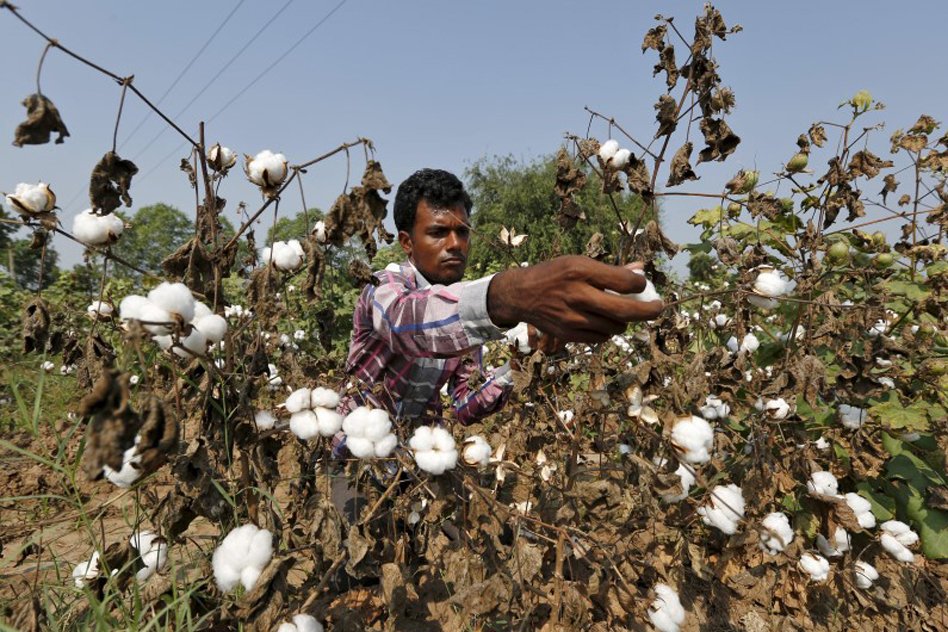The Union government’s decision to switch back to the indigenous seeds is a welcoming step towards cotton farming in India. Infact it is turning out to be a major blow to the Genetically Modified (GM) seed companies. The government cut the prices of GM cotton seeds, popularly known as Bt cotton, and slashed royalty fees.
What has the government done?
According to the new rule the maximum sale price of Bt cotton seeds has been set at Rs 800 ($11.9) for 450 grams against the previous Rs 830 ($12.3) to Rs 1,000 ($14.8) starting from April 2017.
The sharpest cut is on royalty or trait fees. They were reduced by 74%, from Rs.163 per packet to Rs.43 (excluding taxes). The latest prices will come into effect from the next kharif crop season, sowing for which begins in June.
As a result, the world’s largest seed maker, Monsanto, is facing the wrath of the decision. The Missouri-based company threatened to shut down its business in India.
Why is the royalty of the seed giant “Monsanto” slashed?
- The Ministry of Agriculture is citing the argument that the Monsanto BT seed has become ineffective against pink bollworm, which was the claim of the company for charging a huge royalty from farmers. The pest has over the time developed resistance over the seed.
- Bt cotton technology supplied by Monsanto covers as much as about 90% of the seed market in the country. The company has been considered responsible for an increase in a number of drastic farmer suicides in the country due to uncontrolled high prices of its seeds. Over 300,000 Indian farmers have killed themselves since 1995, primarily due to heavy indebtedness.
- As the firm has the monopoly over the Indian market, the Modi government’s plan might be to break Monsanto’s dominance and ensure fair competition in the market.
- The company has been taking undue advantage of illiteracy and poverty of farmers and selling seeds that are of no use and adding to the miseries of the farmers. The firm has been cheating the poor farmers by selling the seeds at unfair rates.
- The diffusion of illegal Bt hybrids that hadn’t been cleared for biosafety standards, leading to fears of environmental toxicity.
Why has the centre interfered?
The Centre’s decision to step into this corporate battle is following complaints that licence providers had not lowered their ‘trait or licence fees’ despite a reduction in retail sale price. But it did so in December last year, with the Cotton Price Control Order, which empowered it to fix a uniform national price of cotton seeds including Bt cotton and trait fees. The Centre wanted to ensure that farmers get the best price for cotton seeds.
What impact will the royalty cut have on the farmers?
This move will benefit nearly 8 million farmers across India by reducing the cost of production. Take for example Maharashtra, it will boost the economic condition of the farmers with the savings of around Rs.225-250 crore only for Maharashtra’s 40 lakh cotton growers.The amount is substantial for individual cotton growers who are caught in the clutches of crop failure, drought and indebtedness. This rule will surely have a positive impact on cotton farming not only in Maharashtra which India’s top state in terms of area under cotton cultivation but throughout the nation.
What will the negative effect of this move in the global scenario?
The move reflected poorly on the country’s intellectual property rights regime.This sends a bad signal internationally that we’re fairly arbitrary. The order does not offer a methodology on how the government arrived at the trait fees. The aim of government is to unduly benefit only one stakeholder i.e the domestic seed supplier. There is nothing wrong in protecting the interests of the citizen. The state have the power to regulate patents but it should be open, transparent and based on robust methodology for a concrete, legitimate purpose. This event can hamper the image of India that PM Modi has been projecting with agenda of “Make in India”.
How will the exit of Monsanto benefit the country?
In India, Monsanto’s exit will uplift the public sector research if more attention is paid to taking outcome to farmers. Also, indigenous seeds will be taken into account which will tend to reduce the cost of production and promote native seeds from the local market.
Will the native seeds prove beneficiary to the farmers?
Though the productivity of native varieties is lower by 10-15% as compared to Bt cotton, but expenditure on pesticides and sprays would be less and farmers can reuse the seeds for next sowing. Prior to the introduction of Bt cotton in 2002, at least 25% of the cotton cultivation area was under indigenous varieties. The efforts would be to regain this lost area.
The Logical Indian welcomes the decision taken by the Union government to promote indigenous seeds over GM seeds. The USP of the Bt. Cotton has been its resistance to the bollworm pest that decimates the usage of pesticides. While the technology helped India become the world’s second largest producer and exporter from a net importer of cotton, in recent years has failed to live upto the purpose for which it was created so there arises a need for a change. We believe that this change in the form of native seeds will not only transform the lives of the farmers by reducing the cost of production and thereby ending their miseries. The indigenous research and development in the seeds will be stimulated.











